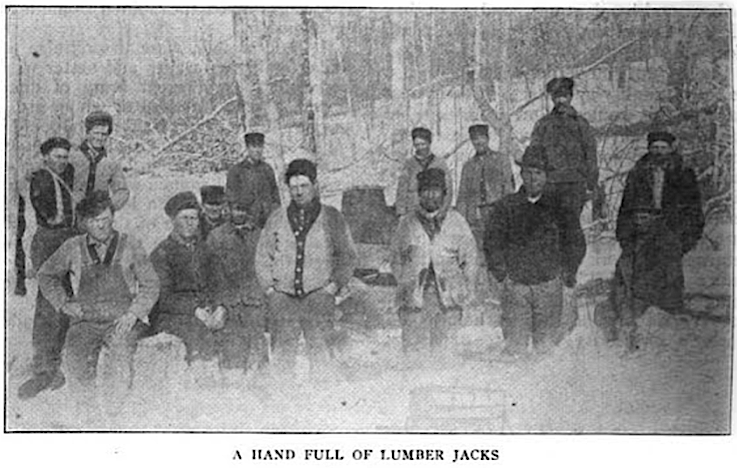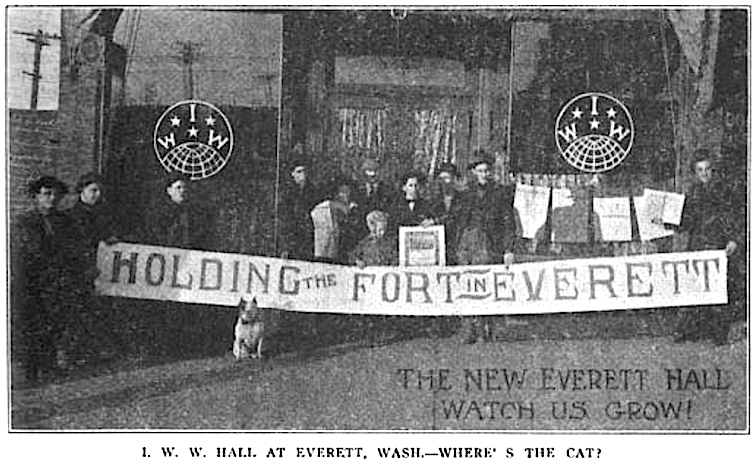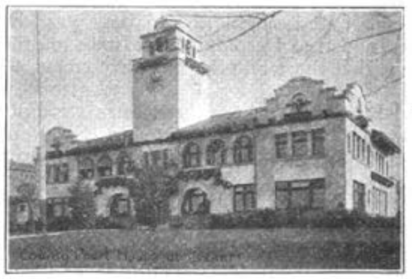We meet today in freedom’s cause
And raise our voices high;
We’ll join our hands in union strong
To battle or to die.
Hellraisers Journal, Thursday March 1, 1917
Everett, Washington – Solidarity can free our brave class comrades!
In an article in this month’s edition of the International Socialist Review, Charles Ashleigh gives some background on the organizing efforts in Everett, Washington, which landed 74 I. W. W. men in the Snohomish County jail facing murder charges. He calls for workers to stand in Solidarity with these heroic class-war prisoners, and states that working-class loyalty can win their freedom.
The Lumber Trust and Its Victims
By CHARLES ASHLEIGH
THE great Northwest! Land of snow-topped hills and fertile valleys; of the gray Puget Sound and timber-covered acres! This is the much vaunted land of plenty, country of enterprise—the State of Washington.
Years ago, the first stalwart pioneers laid the foundation of a civilization which is now ripening to a maturity,—and, it would seem, a decay! The pioneers are gone and, in their place, are the mighty potentates who have come into power over the land: the emperors of lumber. Hundreds of thousands of acres of timber land have become the stage for the slow, grinding industrial drama of the exploitation of the army of slaves of the lumber companies. From myriad logging camps and a multitude of saw-mills flows an ever-increasing volume of fat profit into the gaping maw of the few who own the lumber industry. Along the shores of Puget Sound are a number of busy ports, the purpose of whose existence is the shipping of the lumber to all parts of the world.
And, in the “lower end” or “working-stiff quarter” of every town upon the Sound you can see the producers of this tremendous wealth. Congregated on street corners, in pool halls, in the sitting-rooms of cheap “flop-houses” and in the “employment sharks'” offices are crowds of sturdy men, clad in the high, spiked shoes of the logger, heavy short flannel shirts and mackinaws; these are the human material which the lumber barons use for their enrichment.
The small towns on the Sound are in municipal vassalage to the lumber companies; the county administrations are carried in the vest pockets of the bosses. The proud and strutting mayors and sheriffs, judges and prosecutors, are but marionettes: dancing puppets which move jerkily and obediently as the master pulls the wires from behind the screen.
A land of which poets might sing: a land of broad-lined beauty and of such a richness of resources that a population a thousand times greater might live, every one of them, in the utmost plenitude.
But it is a land befouled. Over it lurks the giant lumber trust, like some great and fearful dragon of fable, laying slavery upon the people, devouring men to satiate its fevered lust for profit. And the workers, in their camps where life is that of a dog, rather than of a man, in the shingle-mills where fingers and hands are given daily to the whirling saws and where wood-dust fills the lungs and kills thousands of victims with consumption—the workers did not for long dare to raise hand or voice against the ogre which towered threateningly above the land.
In the old story, you will remember, it was the young and blithe St. George who went out at last to give battle to the dragon. With shining armor and valiant song of battle the gallant knight rode forth to slay the beast that had been eating the flesh and drinking the blood of the people.
So, also, in these prosaic days, came a young knight, bold, debonair and singing, to lay low the dragon of Industrial Despotism in the land of timber, that the workers might be freed.
It was the Forest and Lumber Workers’ Industrial Union of the of the I. W. W. that stood forth upon the great industrial stage of the Northwest and challenged the monster of profit. Fearless, militant, tireless in propaganda, the young organization sent out a ringing call to the workers in the logging camps to organize under the banner of the One Big Union to gain higher wages, shorter hours, better camp conditions and, eventually, the control of industry.
When the monster recovered from his preliminary astonishment at this audacity, he began to consider and to plan. It was plain, thought the lumber bosses, that this pernicious agitation must no longer continue or profits—sacred, well beloved profits—would diminish. The lustily growing bloom of organization must be killed in the bud or, one of these days, we shall find ourselves stripped of our power and—we may have to work for our living!
In Everett, one of the principal nerve-centers of the lumber industry a big shingle-mill town and a busy lumber port, the lumber slaves were listening in increasing numbers and with growing attention to the propaganda of Industrial Unionism. The situation was sharpened by the strike in some mills of the shingle-weavers and by the very recent strike of the longshoremen. I. W. W. papers were selling readily; street meetings were attracting larger and larger crowds. Soon, in Seattle, was to take place the great conference of lumber workers of the Puget Sound country to consider plans of organization and tactics for a big drive in the logging camps. It was high time, decided the Lumber Monster, to check this before it became too late.
So the wires were pulled and the official puppets started their frenzied dance. The regular police force of Everett was not sufficient—and perhaps not brutal enough—to fulfill to the required extent the desires of bosses. So the “citizens”—meaning those citizens who were either employers or hangers-on of employers—met in their Commercial Club and organized their now notorious “law-and-order” committee. McRae, the then Sheriff of Snohomish County, a willing servant of the timber octopus, promptly deputized these local “respectables.” Stars were given them, and arms, and they were ready for their appointed work.
Everybody has by now heard of the series of brutal assaults perpetrated upon workers in Everett, culminating in the bloody tragedy of November 5th. Two hundred and sixty workers on the steamer “Verona,” were subjected to a cross-fire from three points of ambush by the bodies of vigilantes, armed with high-power rifles, who were stationed on the docks. Five workingmen were killed and many wounded. Two deputies also lost their lives, killed, it is believed, by the fire of another posse of their accomplices on the opposite pier.
The men were all arrested in Seattle on the return of the “Verona” and, after a selective process dictated by the capacity of the Snohomish County Jail, seventy-four of their number were charged with the murder of the two deputies. Or, rather, one should say: charged with the murder of one of the two deputies. For, they were originally charged with the murder of C. O. Curtiss, but, when it came to light that Curtiss’s wound was evidently caused by a high-power rifle bullet, the charge was substituted by another accusing them of the murder of Deputy Jefferson Beard.
And so the next act of this grim drama of the uprising of Labor is to be staged in the Superior County court-room in Everett. There the men are to be tried—not for the murder of a deputy, but for their audacity in questioning the power of the lumber interests.
The dragon has not yet been conquered. Still, over the vast stretches of the timber country, looms the giant shadow of industrial tyranny. And it is hungry for these seventy-four knights of the great company of toilers who came, valiant and with song, to do battle with the swollen beast of profit. They had polished up their weapons, as did the brave St. George—their weapons were of the working class: their shield Solidarity, and their sword the General Strike. But the weapons of the masters are bullets and clubs and jails and the gallows! Which, O workers, shall prevail?
If Solidarity is something more than an empty mouthing these men will not be condemned. If there exists working-class loyalty, our class comrades will go free, once more to resume the only fight worth fighting. The first trial starts on March 5th. The hour draws near! Only the workers can help the workers!
Workers, arouse! Seventy-four of our best and bravest are in danger! In the name of Solidarity and the Industrial Democracy!
* * * * * * *
Funds should be sent to Herbert Mahler, Secretary-Treasurer, Everett Prisoners’ Defense Committee, Box 1878, Seattle, Wash.
Send protests and demands for a congressional investigation and a fair trial for the men to President Wilson and to Governor Lister, Olympia, Wash. Act now!
~~~~~~~~~~~~~~~~~~~~~~
SOURCE and IMAGES
The International Socialist Review, Volume 17
-ed by Algie Martin Simons, Charles H. Kerr
Charles H. Kerr & Company,
July 1916-June 1917
https://books.google.com/books?id=SVRIAAAAYAAJ
ISR of March 1917
https://books.google.com/books/reader?id=SVRIAAAAYAAJ&printsec=frontcover&output=reader&source=gbs_atb&pg=GBS.PA517
“The Lumber Trust and Its Victims”
-by Charles Ashleigh
https://books.google.com/books/reader?id=SVRIAAAAYAAJ&printsec=frontcover&output=reader&source=gbs_atb&pg=GBS.PA536
THE EVERETT COUNTY JAIL
(Tune: “Tramp, Tramp, Tramp, the Boys are Marching”)
By Wm. Whalen
https://en.wikisource.org/wiki/Songs_of_the_Workers_(15th_edition)
In the prison cell we sit
Are we broken hearted—nit
We’re as happy and as cheerful as can be,
For we know that every wob
Will be busy on the job,
Till they swing the prison doors and set us free.
CHORUS
Are you busy Fellow Workers
Are your shoulders to the wheel?
Get together for the cause
And some day you’ll make the laws.
It’s the only way to make the masters squeal.
Though the living is not grand,
Mostly mush and coffee and,
It’s as good as we excepted when we came.
It’s the way they treat the slave
In this free land of the brave
There is no one but the working class to blame
When McRea, and Veitch, and Black
To the Lumberyards go back
May they travel empty handed as they came.
May they turn in their report
That the wobs still hold the fort
That a rebel is an awful thing to tame.
When the 65 per cent
That they call the working gent
Organizes in a Union of its class
We will then get what we’re worth
That will be the blooming’ earth.
Organize and help to bring the thing to pass.
———-



